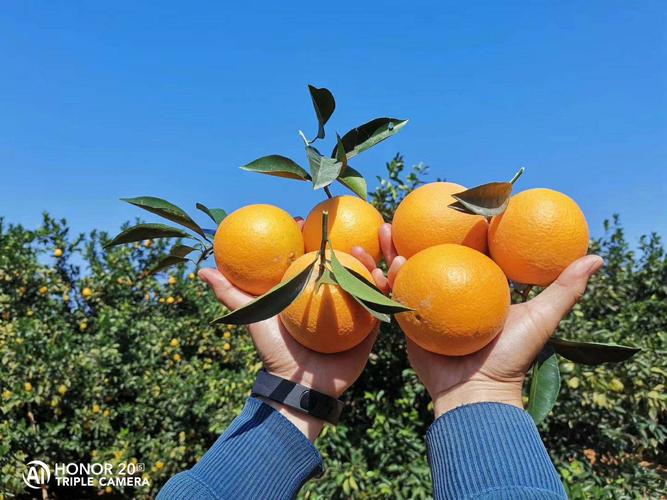
There’s an old oak at the edge of our grove, its branches sprawling like arms reaching for the sky. I’ve climbed it since I was a kid—scraped knees, sticky hands, and all—and now, as I walk past it each morning, I still pause. Its roots run deeper than our family’s history here, and so do the stories it’s seen: my grandfather planting the first trees, my father fixing irrigation lines in storms, and me, now, teaching my daughter to read the leaves.
This grove isn’t about speed. It’s about time—the kind that lets trees grow slow, that lets soil breathe, and that lets us learn from the land, not just command it.
Grandpa’s Rule: “Let the Tree Decide”
Grandpa never liked calendars. “Oranges don’t care what the almanac says,” he’d grumble, squinting at buds in February. “They care if the soil’s warm enough, if the wind’s been kind.” He taught us to trust the tree’s own rhythm.
Take flowering. Most groves push blooms with sprays or timers. Us? We wait. We watch for the nights to soften, for the bees to hum louder, for the tree itself to swell with tiny green nubs. “If it’s ready,” Grandpa said, “you’ll smell it before you see it—a sweet, heady whisper on the breeze.”
And when frost threatens? We don’t panic. We light smudge pots, yes, but mostly, we huddle under the oak, drinking coffee, and let the trees lean on the warmth they’ve stored all year. Last winter, a late freeze nipped a corner of the grove. We lost a few young trees, but the old ones? They shrugged it off, their roots anchored deep, their fruit still plump come fall. Grandpa would’ve called that “the land keeping score.”
Hands in the Dirt: Work That Feels Like Worship
Farming here is prayer with sweat.
Morning chores start with mulching—we rake last fall’s leaves and coffee grounds from the diner (they add nitrogen, but mostly, they smell like home) around tree bases. My daughter, Lila, now 9, calls it “tucking the trees in.” She’s obsessed with finding worms; “They’re the tree’s best friends,” she announces, grinning as she drops one back into the soil.
Harvest days are slow and sacred. We move row by row, baskets swinging, hands cupped to catch oranges before they tumble. Old Man Hector, who’s picked here since before I was born, insists on doing it barefoot. “Feels the tree’s pulse,” he says, wiggling his toes in the dirt. “You can’t rush what grows from the heart of the earth.”
And we don’t. A single orange might take two hands to lift—heavy, warm from the sun, its skin glowing like polished amber. We set them gently in crates, not stacked, so they don’t bruise. “These aren’t bricks,” Hector chuckles. “They’re gifts.”
The Beauty of “Flaws”
Perfection is overrated. Ask Lila. Last spring, a hailstorm scarred half our crop—dents, scrapes, even a few with holes chewed by birds. We were gutted… until Lila brought me one, its peel crumpled like an old map. “This one’s brave,” she said. “It survived!”
Now, we call them “weather oranges.” They go to the diner, where the cook makes marmalade and calls it “storm-in-a-jar.” They go to the elementary school, where kids paint them and write stories about “orange superheroes.” And some stay right here, left for deer or squirrels—because even the “imperfect” ones deserve a feast.
What You’ll Hold: A Piece of Our Story
When you bite into one of our oranges, I hope you taste more than fruit. Taste the oak’s shade on hot afternoons. Taste the coffee grounds in the mulch. Taste Lila’s laughter as she chases worms. Taste Grandpa’s stubborn faith in letting trees lead.
The juice? It’s sunshine concentrated—bright, tangy, then sweet, like a memory of summer campfires. The peel? It smells like the grove after rain—earthy, citrusy, alive. And when you finish, you’ll notice: no waxy coating, no plastic wrap. Just an orange, as nature intended, with a story etched into every crease.
Stay a While (Even If You’re Far Away)
If you visit, pull up a chair under the oak. We’ll brew sweet tea, hand you a basket, and let you pick. Lila will teach you to find worm holes (“Proof it’s loved!”), and Hector will show you how to shake a branch gently—“Listen for the thunk,” he’ll say. “That’s the sound of a happy orange.”
If you’re miles away, we’ll pack your order with straw and twine—no fancy boxes, just care. These oranges aren’t just fruit. They’re a piece of our grove, our family, and our belief that the best things in life grow when you let time do its work.
So go ahead. Peel one. Let the juice dribble down your chin. And taste the oak, the worms, and the years of patience that made it possible.
Our grove is here. And it’s waiting to share its time with you.
Article link:https://www.vlefooena.com/under-the-old-oak-how-our-navel-oranges-grow-with-time-not-rush

No reply content